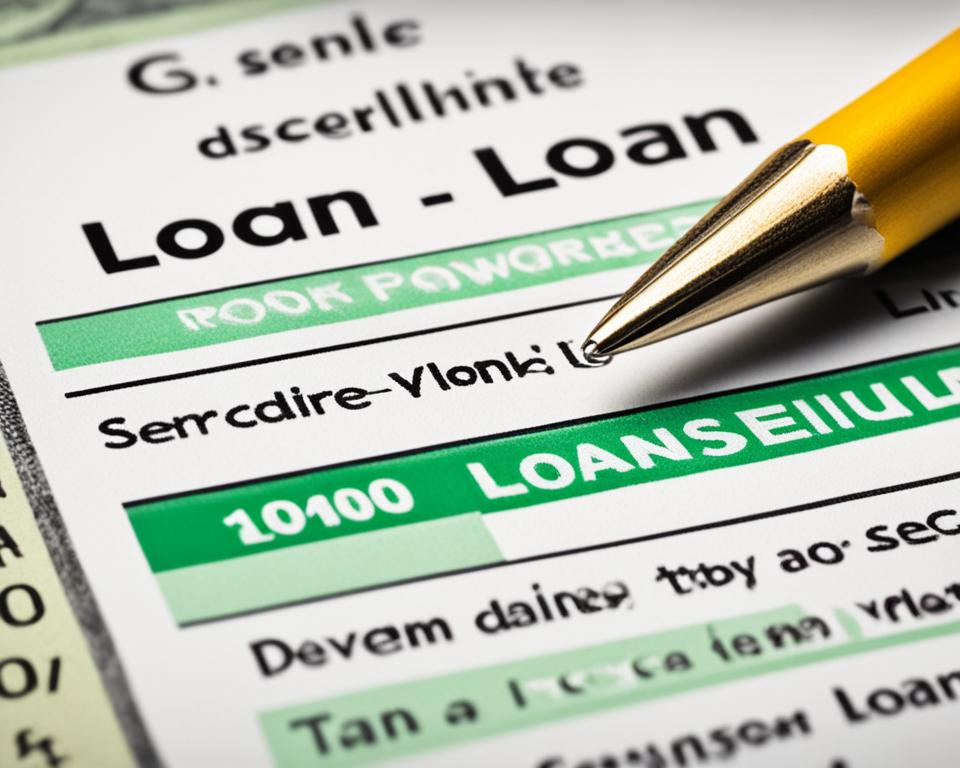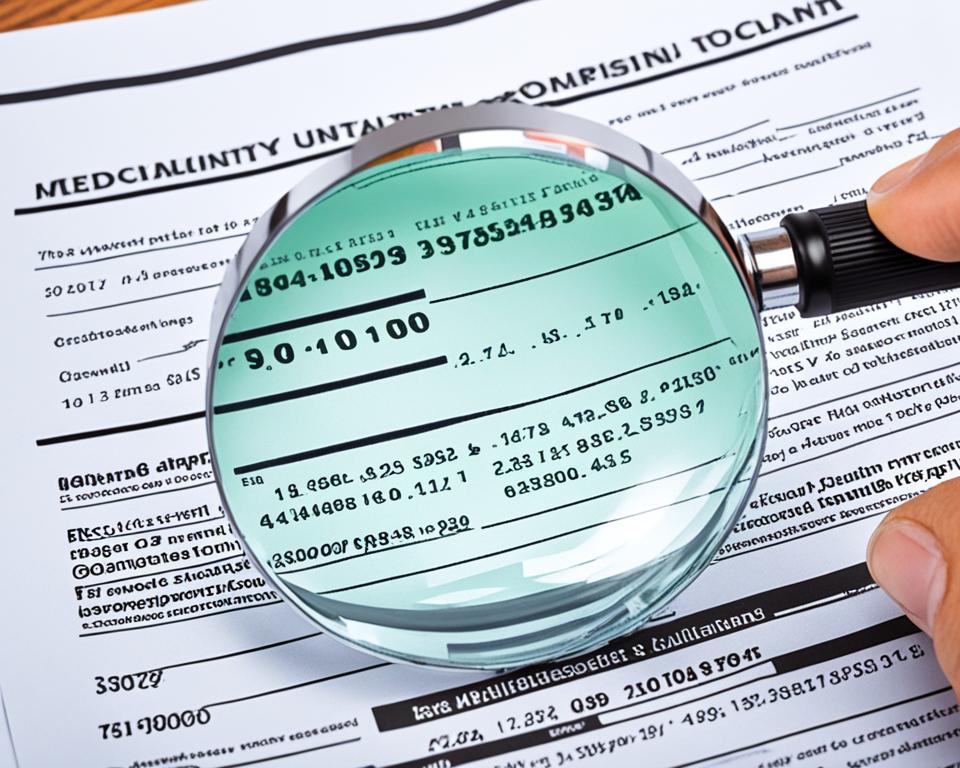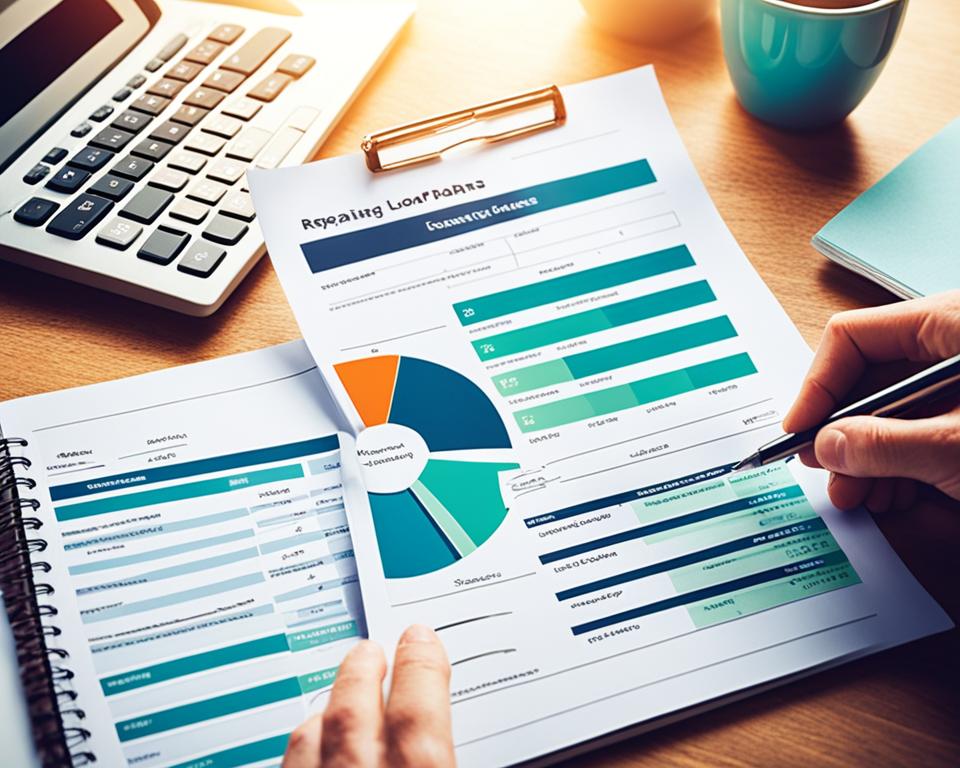Secured loans or unsecured loans? When it comes to borrowing money, these are two common options that individuals have. But what exactly is the difference between the two, and which one should you choose? Let’s explore the key factors that set secured and unsecured loans apart, so you can make an informed decision.
Key Takeaways:
- Secured loans require collateral, while unsecured loans do not.
- Secured loans often have lower interest rates compared to unsecured loans.
- Collateral is used as a safety net for lenders in secured loans.
- Unsecured loans are based solely on creditworthiness and financial stability.
- Consider your financial situation and goals when choosing between the two.
Understanding Secured Loans
Secured loans are a popular choice for individuals seeking financial assistance. These loans offer several benefits, primarily due to the collateral requirement. When you apply for a secured loan, you are required to provide collateral, such as a car or a home, to secure the loan. This collateral serves as a guarantee to the lender that they can recoup their losses if you fail to repay the loan. As a result, secured loans often have lower interest rates compared to unsecured loans, making them an attractive option for borrowers.
Obtaining a secured loan, however, requires meeting certain requirements. One of the most important factors is having a valuable asset to use as collateral. This asset should have a sufficient value to cover the loan amount. The lender will assess the ownership and value of the collateral to determine whether it meets their requirements. Proof of ownership, such as vehicle titles or property deeds, will be required, along with an evaluation of the collateral’s value.
Secured Loan Requirements
When applying for a secured loan, keep in mind the following requirements:
- Ownership of a valuable asset
- Evaluation of the collateral’s value
- Proof of ownership
I was able to secure a loan by using my car as collateral. It was a straightforward process, and the lower interest rate made it a cost-effective option for me.
By meeting these requirements, you can increase your chances of getting approved for a secured loan. It’s important to carefully consider your financial situation and the potential risks associated with using collateral before applying for a secured loan.
| Pros of Secured Loans | Cons of Secured Loans |
|---|---|
| Lower interest rates | Possible loss of collateral if loan is not repaid |
| Higher borrowing limits | May require extensive documentation |
| Longer repayment terms | May not be suitable for those without valuable assets |
Exploring Unsecured Loans
Unsecured loans offer a distinct alternative to secured loans as they do not require any collateral. Unlike secured loans that rely on valuable assets like homes or cars, unsecured loans are based solely on the borrower’s creditworthiness. While unsecured loans typically come with higher interest rates compared to secured loans, they come with several advantages worth considering.
- Preserve Your Assets: One of the key advantages of unsecured loans is that they do not put your valuable assets at risk. With secured loans, defaulting on payments may result in the lender seizing your collateral. Unsecured loans eliminate this concern, allowing you to maintain ownership of your assets.
- Quick Application Process: Unsecured loans often come with a quicker and simpler application process compared to secured loans. Without the need for collateral verification, the loan approval process can be expedited, providing you with the funds you need in a shorter period of time.
To qualify for an unsecured loan, certain criteria must be met. Lenders typically consider factors such as a good credit score, a stable source of income, and a low debt-to-income ratio. Meeting these qualifications increases your chances of obtaining an unsecured loan and enjoying its advantages.
Unsecured loans can be an excellent choice for individuals who prioritize asset protection and a streamlined borrowing process. However, it’s essential to carefully evaluate your financial situation and consider the potential implications of higher interest rates. By understanding the qualifications and advantages of unsecured loans, you can make an informed decision that aligns with your financial goals.
Pros and Cons of Secured Loans
Secured loans come with a range of advantages and disadvantages that are important to consider before making a decision. Let’s explore both sides:
Advantages of Secured Loans
- Lower Interest Rates: One of the main benefits of secured loans is the lower interest rates compared to unsecured loans. This can save you a significant amount of money over the loan term.
- Higher Borrowing Limits: Secured loans typically offer higher borrowing limits, allowing you to access more funds for your financial needs.
- Longer Repayment Terms: With secured loans, you may have the option to choose longer repayment terms, which can make monthly repayments more affordable and manageable.
Disadvantages of Secured Loans
- Risk of Collateral Loss: The main downside of secured loans is the risk of losing your collateral if you default on the loan. This can be particularly concerning if the collateral is an asset of high value, such as a house or a car.
When considering a secured loan, it’s crucial to carefully weigh the pros and cons. The lower interest rates, higher borrowing limits, and longer repayment terms can be advantageous. However, the risk of losing your collateral needs to be taken into account. Assess your financial situation and goals to determine if a secured loan is the right choice for you.
Advantages of Unsecured Loans
Unsecured loans have several advantages that make them a popular choice among borrowers:
- No collateral requirement: Unsecured loans do not require any collateral, which means you don’t need to put your valuable assets at risk. This can be a major advantage for individuals who don’t own property or are hesitant to use their assets as collateral.
- Quick application process: Unlike secured loans, unsecured loans often have a faster application process. The absence of collateral evaluation can expedite the approval and funding process, providing borrowers with quicker access to the funds they need.
- Accessibility to those with less-than-perfect credit: Unsecured loans may be available to individuals with less-than-perfect credit scores. While creditworthiness is still a factor in the loan approval process, lenders may be more willing to consider other aspects of the borrower’s financial profile, such as income and employment stability.
These advantages provide borrowers with flexibility and convenience when seeking financial assistance. Whether you need funds for a home renovation, debt consolidation, or unexpected expenses, unsecured loans can be a viable option worth considering.

Do keep in mind that unsecured loans typically come with higher interest rates compared to secured loans. It’s important to carefully assess your financial situation, creditworthiness, and repayment ability before making a decision. Conduct thorough research and consult with financial professionals to determine the best loan option for your specific needs.
Factors to Consider When Choosing Between Secured and Unsecured Loans
When deciding between secured and unsecured loans, there are several factors that you should consider. Making the right choice depends on evaluating your financial situation and understanding the implications of each loan type. Consider the following factors:
- Collateral: Determine if you have valuable assets that you are comfortable using as collateral for a secured loan. Keep in mind that with a secured loan, there is a risk of losing the collateral if you default on the loan.
- Credit Score: Check your credit score to see if you can qualify for an unsecured loan. Unsecured loans rely heavily on your creditworthiness and having a good credit score can increase your chances of approval.
- Interest Rates: Compare the interest rates offered for both secured and unsecured loans. Secured loans typically have lower interest rates due to the presence of collateral, while unsecured loans tend to have higher interest rates since they are not backed by any assets.
- Repayment Terms: Examine the repayment terms associated with each loan type. Consider the length of the loan, the monthly payment amount, and any penalties for early repayment.
Additionally, it’s important to think about your long-term financial goals and how the loan will fit into your overall financial plan. Will the loan help you achieve your objectives? Take the time to carefully weigh all these factors before making a decision.
“Choosing between secured and unsecured loans requires thoughtful analysis of your financial situation, creditworthiness, and loan terms. By considering these factors, you can make an informed decision that aligns with your long-term goals.” – Financial Advisor
Loan Comparison Table
| Factors | Secured Loans | Unsecured Loans |
|---|---|---|
| Collateral Requirement | Collateral required (e.g., car, home) | No collateral required |
| Interest Rates | Usually lower | Usually higher |
| Approval Process | May be more complex due to collateral evaluation | May be quicker and easier |
| Borrowing Limits | May be higher | May be lower |
| Repayment Terms | Longer repayment terms | Shorter repayment terms |
| Risk | Risk of losing collateral if you default | No risk of losing collateral |
By carefully considering these factors and reviewing the loan comparison table, you can make an educated decision that suits your financial needs and aligns with your long-term goals.
Understanding Loan Terms and Conditions
When applying for a loan, it’s crucial to understand the terms and conditions of the loan agreement. Taking the time to review and comprehend these details can help you make informed decisions and avoid any potential pitfalls down the road.
Interest Rate: One of the key components of a loan agreement is the interest rate. This is the percentage that the lender charges on the borrowed amount. Make sure to carefully evaluate the interest rate to determine the total cost of borrowing over the loan’s duration.
Fees: In addition to the interest rate, loan agreements may include various fees. These could include origination fees, processing fees, or late payment fees. Take note of these charges and factor them into your calculations to have a complete understanding of the loan’s cost.
Repayment Schedule: Loan terms and conditions specify the repayment schedule, which outlines the frequency and amount of payments required to satisfy the loan. Be sure to review the repayment schedule to ensure it aligns with your financial capabilities and goals.
Penalties: Loan contracts often outline penalties for late payments or early repayment. Familiarize yourself with these penalties to avoid any unexpected financial burdens. It’s important to understand the consequences of defaulting on the loan and the potential impact on your credit score.
If you have any questions or concerns about the loan terms and conditions, don’t hesitate to reach out to the lender for clarification. It’s essential to have a clear understanding of the agreement before signing on the dotted line.
“Reviewing and understanding the terms and conditions of a loan agreement is crucial. It empowers you to make informed decisions and ensures that you are aware of your rights and responsibilities throughout the loan period.”
| Loan Terms and Conditions | Key Considerations |
|---|---|
| Interest Rate | Review the interest rate to determine the cost of borrowing |
| Fees | Understand and factor in any fees associated with the loan |
| Repayment Schedule | Ensure the repayment schedule aligns with your financial capabilities |
| Penalties | Be aware of any penalties for late payments or early repayment |
Consider the Fine Print
Loan agreements can be complex, but taking the time to carefully review the terms and conditions can save you from future financial headaches. Don’t hesitate to seek legal or financial advice if needed. Remember, an informed borrower is a responsible borrower.
Seeking Professional Advice
When it comes to making important financial decisions, such as choosing between secured and unsecured loans, I always recommend seeking professional advice. A financial advisor or loan expert can provide you with the guidance and expertise you need to make an informed decision that aligns with your unique circumstances and financial goals.
By consulting a professional, you can gain a deeper understanding of the potential risks and benefits associated with each type of loan. They can analyze your current financial situation, evaluate your creditworthiness, and help you weigh the advantages and disadvantages of secured and unsecured loans.
Whether you need professional loan advice, loan guidance, or assistance from a financial advisor, their expertise can be invaluable in helping you navigate the complex world of loans. They can offer personalized recommendations based on your specific needs and financial objectives, empowering you to make the best decision for your financial future.
Remember, a professional loan advisor can:
- Assess your financial situation and goals
- Evaluate the potential risks and benefits of secured and unsecured loans
- Provide personalized guidance and recommendations
- Help you understand the terms and conditions associated with each type of loan
- Address any questions or concerns you may have
By seeking professional advice, you can approach your loan decision with confidence, knowing that you have expert support every step of the way. Don’t underestimate the value of their knowledge and experience in helping you secure the loan that best suits your needs.
| Benefits of Seeking Professional Advice | Why Choose a Financial Advisor? |
|---|---|
| Personalized Guidance | In-Depth Knowledge |
| Expertise and Experience | Finding the Best Loan Terms |
| Understanding the Fine Print | Tailored Solutions |
Conclusion
When faced with the choice between secured and unsecured loans, it is important to carefully evaluate your financial situation and goals. Each type of loan has its own advantages and drawbacks, and understanding these factors is crucial in making an informed decision.
Consider whether you have valuable assets that you are comfortable using as collateral for a secured loan. Evaluate your creditworthiness and whether you can qualify for an unsecured loan. Take into account the interest rates and repayment terms associated with both types of loans.
Seeking professional advice can provide valuable insights and guidance tailored to your specific needs. Financial advisors or loan experts can help you navigate the complexities of lending and assist you in making the best choice for your financial well-being.
Ultimately, by carefully considering factors such as collateral, creditworthiness, interest rates, and repayment terms, you can make an informed decision that aligns with your financial needs and goals.
FAQ
What’s the difference between secured and unsecured loans?
Secured loans require collateral, such as a car or a home, while unsecured loans do not require any collateral.
What are the requirements for getting a secured loan?
To get a secured loan, you need to meet certain requirements, such as having a valuable asset to use as collateral and providing proof of ownership and value of the collateral.
How do I qualify for an unsecured loan?
To qualify for an unsecured loan, you typically need to have a good credit score and a stable source of income.
What are the advantages of secured loans?
Secured loans offer lower interest rates, higher borrowing limits, and longer repayment terms.
What advantages do unsecured loans offer?
Unsecured loans do not require collateral, have a quicker application process, and may be available to those with less-than-perfect credit.
What factors should I consider when choosing between secured and unsecured loans?
Consider your financial situation, whether you have valuable assets to use as collateral, your credit score, and the interest rates and repayment terms associated with each type of loan.
What should I review in the terms and conditions of a loan?
Pay attention to the interest rate, fees, repayment schedule, penalties for late payments or early repayment, and the consequences of defaulting on the loan.
Should I seek professional advice when choosing a loan?
It’s always a good idea to seek professional advice from a financial advisor or loan expert who can provide personalized guidance based on your specific needs and circumstances.
How do I make the best choice for my financial needs?
Carefully evaluate your financial situation, goals, and the potential risks and benefits associated with each type of loan before making a decision.





